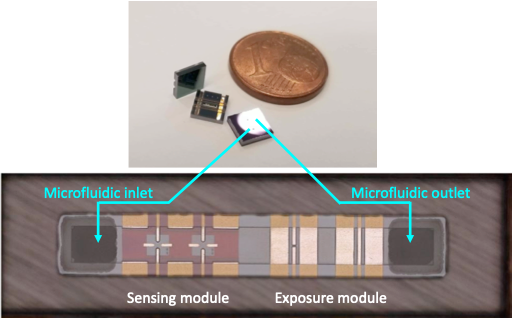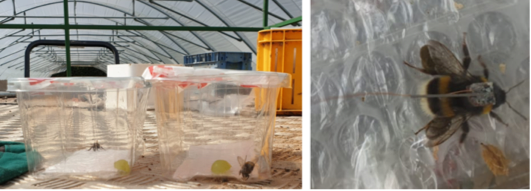Energy, Environment and Bio-sensing
Energy, Environment and Bio-sensing
Research in EEBG focuses on developing new low carbon energy sources (solar, marine and nuclear) and sensing of biological and environmental effects. The group develops Internet of Things (IoT) wireless sensor networks for real work problems such as monitoring the effects of climate change. Bangor has been successful with the award of a number of major grants, including via the European Commission (e.g. H2020 funded SUMCASTEC project (www.sumcastec.eu)), Welsh Government (e.g. SPARC II) and the UK government (e.g. the EPSRC CDT in Nuclear Energy Futures. The group works closely with the School of Natural Sciences in Bangor University and students often work on inter-disciplinary research activities and themes. Research collaborators in the UK include the University of Cambridge, Imperial College London, Cardiff, Swansea and Manchester Universities. The group also has international links in the USA, Israel, Spain, Germany, France, Brazil, China and Portugal. A number of our students have also participated in research exchanges to the Massachusetts Institute of Technology. EEBG comprises of four laboratories and one institute: the solar, marine, biosensing, and environmental sensing laboratories, and the nuclear futures institute.
Solar
Whilst new generations of PV technologies offer promises of lower energy production and possibilities to integrate into building integrated applications or for energy harvesting such as for phone charging, the stability remains a critical issue for commercialisation as they have to survive for 20+ years outdoors, without maintenance. Bangor University uses material analysis techniques to study causes of failure and use accelerated testing to predict stability in the future. For undertaking such work, Bangor University has a suite of testing equipment and reliability software dedicated for studying reliability and performance of solar cells.
Bangor University is a member of the SPARC II consortium, a £7m WEFO funded project to develop new themes in solar/photovoltaic (PV) energy research. Bangor University also works closely with UK industry, in particular in the area of concentrated PV (CPV). Funding from UKRI is being used to study how large concentrator optics can be used to focus light up to 1000 times onto a small semiconductor solar cell (typically less than 1 cm²).
Marine
The School works closely with the School of Ocean Sciences to develop tidal and wave power sources. The research provides insight into the best locations for marine energy production, but also provides developers an in-depth understanding of energy production technologies and their performance, potential impacts from sea-level change on generators, and the impact proposed schemes will have on their surrounding marine environments, such as the seabed, marine animals and clients.
Biosensing
The school develops laboratory-on-chip technologies for diagnostics and biological cell treatment. Notably, our groups approach pursues the integration of high frequency microelectronics (Bi-CMOS), microfluidics and microimaging technologies onto a single chip (Fig. X). This is being applied forl sorting and neutralization of cancer stems cells. This is expected to enable integration of the technology into electrosurgical probes for cancer and regenerative medicine in collaboration with an industry leader in endoscopy surgery technology such as Creo Medical Ltd. (http://investors.creomedical.com).

Microelectronics/microfluidics lab-on-chip integrating biological cell sensing and exposure module in a BiCMOS platform.
Environmental sensing
The department develops bespoke real-time sensors for monitoring of pollution levels, environmental conditions and manufacturing processors. For example, our group has introduced the world first self-sustained radio-tracking device (Fig. X) that can be attached to a honey bee (http://www.thebangoraye.com/bbc-countryfile-visits-north-wales/). Such device harnesses the wing power generated by honey and bumblebees, which can be converted into a suitable signal for detection by drones flying above the target insect. The group is also working with the agritech sector to develop solutions to support the integration of Internet of Things wireless sensor networks in smart hives, farms or greenhouses. Therefore, Low Range Wide Area Network (LoRaWAN) boards will be deployed in conjunction with self-powered Radio Frequency Identification (RFID) sensors to autonomously monitor temperature, light level, humidity, CO2, hive infrared imaging and vibroacoustic signals.

Bumblebees tagged with Bangor’s energy harvesting/transmitter devices in a smart greenhouse environment.
Nuclear Futures Institute
The School is also home to the Nuclear Futures Institute. With nuclear decommissioning and nuclear new-build projects on its doorstep, and an increasing number of businesses from the nuclear supply chain becoming active in the area, the University is focussing on existing and emerging nuclear power generation technologies including Pressurised Water Reactors (PWR), (Advanced) Boiling Water Reactors ((A)BWR) and Small Modular Reactors (SMR). researchers to help develop future generations of Boiling Water Reactor technology.
Nuclear expertise and academic capacity at Bangor University is expanding rapidly with the appointment of international research ‘stars’, plus their supporting research teams, funded by the Welsh Government’s Sêr Cymru programme and the European Regional Development Fund. More…
